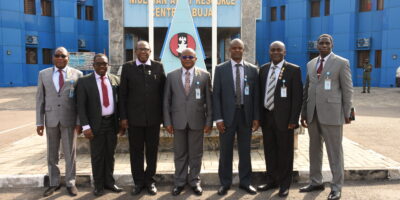A one-day seminar on Command and Leadership was organized and conducted by the Nigerian Army Resource Centre at its office complex on 21 July 2016. The theme of the seminar was Command and Leadership Responsibilities. It was meant for field commanders of the 3 Services and the Nigeria Police of the ranks of Colonel and Brigadier General and their equivalents. Two topics were carefully selected to discuss the challenges of command and leadership in the armed forces of Nigeria and the Nigeria Police, particularly as they relate to the ongoing Internal Security (IS) operations in the country. The 2 papers were The Burden of Command Responsibility and Command Responsibilities: The Legal Perspective. The exposition by the lectures and the interrogation that followed during the interactive sessions did justice to the topics. Consequently, the challenges of command and leadership in our Armed Forces and the Police were adequately brought out and thoughtful recommendations were made.
The first lecture delivered by Maj Gen Adeniyi Oyebade, GOC 1 Division, analysed the burden of command at difficult moments. It further addressed the need for individual commanders to take action without fear of perceived failure of the system to protect them in case of litigation. It x-rayed the multiplicity of tasks undertaken by the military in the form of internal security operations, the need for effective training and provision of appropriate equipment. Furthermore, the education of the populace on the Rules of Engagement (ROE) and the need for adequate coverage of operational activities by organic and assigned media organisations were clearly emphasized. The second paper by Brig Gen Yusuf Ibrahim Shalangwa, Director Legal Service, addressed the need for commanders to be knowledgeable in military law and for them to always consult their legal officers on issues relating to the laws of the land. It opined that the Legal Service would develop the capacity to deploy more legal officers to units and create awareness on Section 239 of the Armed Forces Act which deals with indemnity while performing lawful duties.
The Director General NARC, Maj Gen JGS Hamakim, in his concluding remarks, upheld that all emphasis made by all the contributors and stakeholders must be seen from the angle of professionalism and remodeling of the Nigerian Army into a better force that can compete globally with other armies of the world. Similarly, the Chief of Army Staff, Lt Gen TY Buratai, stated in his closing remarks that the seminar was timely as it was designed to address the burden of command and leadership, with its attendant legal implications. He reiterated the need to improve on command and leadership potentials in the face of non-traditional security challenges and commended the NARC for a successful seminar.














